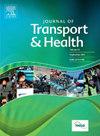The moderating effects of perceived transportation access on health and social connectedness for people with disabilities
IF 3.3
3区 工程技术
Q2 PUBLIC, ENVIRONMENTAL & OCCUPATIONAL HEALTH
引用次数: 0
Abstract
Background
Transportation is an important resource for people to fully participate in their communities. People with disabilities who have access to reliable transportation report better social connectedness outcomes than those with less access. However, research has not yet examined how transportation access and other factors associated with social connectedness, such as self-rated health, influence social connectedness.
Objective
The purpose of this study was to examine how access to transportation affects the association between self-rated health and social connectedness for people with disabilities.
Methods
Moderated regressions were conducted using cross-sectional data from waves 2–4 of the National Survey on Health and Disability (NSHD) to examine the moderating effects of perceived transportation access on self-rated health and two dimensions of social connectedness: loneliness and social activity. The analysis focused on working-aged adults (18–64) with disabilities in the United States.
Results
Transportation access moderated the relationship between self-rated health and loneliness but not social activity. Among people with disabilities who had access to reliable transportation, the magnitude of change between self-rated health and loneliness was stronger compared to those without reliable transportation.
Conclusion
These findings highlight how transportation access plays a role in the relationship between health and social connectedness for people with disabilities. Policies that improve transportation access are needed to support greater social connectedness and better health outcomes for people with disabilities.
感知交通可及性对残疾人健康和社会联系的调节作用
交通是人们充分参与社区活动的重要资源。拥有可靠交通工具的残疾人报告说,他们的社会联系结果比那些交通不便的人更好。然而,研究还没有调查交通运输和其他与社会联系相关的因素,如自评健康,是如何影响社会联系的。目的本研究的目的是探讨交通如何影响残疾人自评健康与社会联系之间的关系。方法采用全国健康与残疾调查(NSHD)第2-4波的横截面数据进行适度回归,考察交通可达性对自评健康和社会联系两个维度(孤独和社会活动)的调节作用。该分析的重点是美国处于工作年龄的残疾成年人(18-64岁)。结果交通可调节自评健康与孤独感的关系,但对社交活动无调节作用。在有可靠交通工具的残疾人中,与没有可靠交通工具的残疾人相比,自评健康和孤独感之间的变化幅度更大。结论交通可及性在残疾人健康与社会联系关系中起着重要作用。需要制定改善交通便利的政策,以支持加强社会联系,改善残疾人的健康状况。
本文章由计算机程序翻译,如有差异,请以英文原文为准。
求助全文
约1分钟内获得全文
求助全文

 求助内容:
求助内容: 应助结果提醒方式:
应助结果提醒方式:


